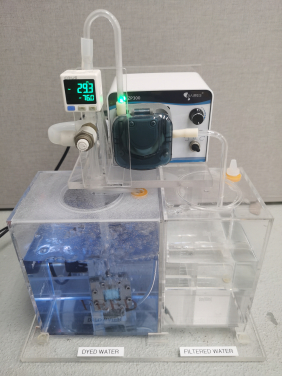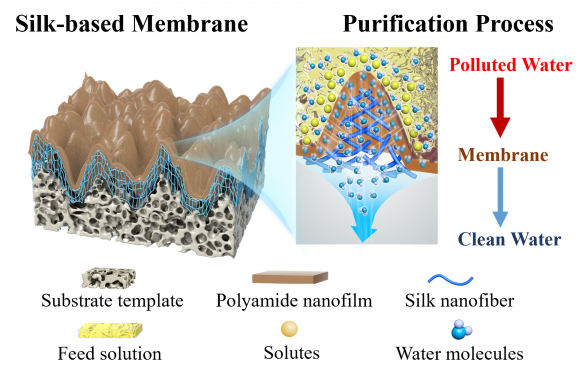Media
HKU Engineering Researchers Develop Revolutionary Silk-based Ultra-fast Filtration Membrane for Water Purification
07 Jan 2025

Figure 2. Prototype of vacuum-driven nanofiltration showing the efficient purification of dyed water (Credit: Mr. Bowen Gan)

Figure 1. Structure of silk-based nanofiltration membrane and schematic diagrams of the corresponding filtration process (Credit: Mr. Bowen Gan)
- 1 / 2
- 2 / 2
A research team led by Professor Chuyang Tang, Chair Professor from the Department of Civil Engineering, Faculty of Engineering at the University of Hong Kong (HKU), has developed a novel nanofiltration membrane using natural silk, which could revolutionise the process of water purification or treatment.
Nanofiltration membranes are widely used in applications such as industrial wastewater processing, treatment or water filtration at home. They can remove a wide range of contaminants including heavy metals, organic molecules, and microorganisms, while allowing water and beneficial mineral ions (such as Ca2+, Mg2+) to pass through.
However, the current approach has a major drawback. It requires extremely high pressure, up to 10 bar (10 times of the normal atmospheric pressure), making the process energy-intensive and expensive, with also the need for bulky equipment.
To tackle this problem, Professor Chuyang Tang and his team developed a silk-based nanofiltration membrane (Figure 1) that can achieve water purification at much lower pressure, in fact using a partial vacuum (< 1 bar) instead of high pressure (Figure 2).
In tests, the silk membrane achieved a water flow rate of 56.8 liters per square meter per hour, at a vacuum pressure of less than 1 bar. While allowing beneficial minerals to pass through, this membrane rejects over 99% of organic pollutants in water, e.g., the notorious perfluorinated compounds—also widely known as forever compounds that have caused global concerns over their toxicity and persistence.
"Our new silk-based membrane is a game-changer," said Professor Chuyang Tang. "It can filter water nearly 10 times faster than classic commercial nanofiltration membranes, while still efficiently removing harmful contaminants. And it can do this using just a light vacuum suction, not intense pressure."
The silk "ultra-permeable membrane" is sustainable and highly cost-saving, cutting energy consumption by around 80% compared to conventional nanofiltration systems. Prof Tang’s team has obtained a patent for the ground-breaking discovery, which was recently published in the journal Nature Communications, in an article entitled “Ultra-permeable Silk-based Polymeric Membranes for Vacuum-driven Nanofiltration”.
“Silk is an amazing material—strong, flexible, and eco-friendly. We've harnessed its unique properties to push the boundaries of water purification," explained Mr. Bowen GAN, the first author of the journal article and a PhD student supervised by Professor Tang.
Link to the article: https://www.nature.com/articles/s41467-024-53042-6
About Professor Chuyang Tang
Chuyang Tang is a Chair Professor in the Department of Civil Engineering at the University of Hong Kong and leads the Membrane-based Environmental & Sustainable Technology (MemBEST) group. His research focuses on membrane technology, environmental materials, desalination, water reuse, resource recovery, and water-energy nexus. He has over 300 refereed publications, with a total citation of >46,000 and H-index of 119 (Google Scholar). He has been recognised as a Clarivate Highly Cited Researcher since 2021. Professor Tang is a Co-Editor of Desalination and an Editorial/Advisory Board Member of several flagship journals in relevant research areas, including Environmental Science & Technology Letters and Journal of Membrane Science. He is a Fellow of Royal Society of Chemistry and a Fellow of Institution of Civil Engineers. Professor Tang is a recipient of RGC Senior Research Fellowship, HKU Outstanding Researcher Award, HKU Innovator Award, CAPEES/Nanova Frontier Research Award, International Desalination Association Water Reuse & Conservation Award for Outstanding Professional, Singapore Ministry of National Development R&D Merit Award, Finland Distinguished Professor Program Fellowship, and International Desalination Association Fellowship.
For media enquiries, please contact:
Faculty of Engineering, HKU
Ms Christina Chung (Tel: 3910 3324; Email: chungmc@hku.hk)
Ms Natalie Yuen (Tel: 3917 1924; Email: natyuen@hku.hk)
